Elastic Compute Cloud (EC2) from Amazon Web Services (AWS) is a processing service offered by virtual servers. The purpose of backing up systems is to preserve data and remove the danger of being lost or altered.
Backing up data is an insurance measure. Companies might never experience problems. However, they can get their data back immediately if a disaster occurs, and the business can carry on as usual. There are three significant threats to data, failure of the server that holds it, accidental or intentional deletion, or encryption by ransomware.
Here is our list of the five best AWS EC2 backup tools:
- N-able Backup EDITOR’S CHOICE Although this backup tool isn’t integrated into AWS EC2 or available in the AWS Marketplace, it is written to run on the platform, and it will install easily. With this system, you can back up to the N-able cloud storage server included in the price.
- Clumio This service is offered through AWS Marketplace; it is cheaper than AWS Backup and includes ransomware protection.
- Druva This is an integrated service that you can get through the AWS Marketplace. This service operates its own SaaS platform, but AWS provides its underlying resources.
- N2WS Backup & Recovery Available through AWS Marketplace, this system backs up EC2 and associated EBS and is offered in free and paid versions.
- Acronis Cyber Protect A backup system that manages many cloud platforms plus on-premises servers or individual applications wherever they run.
Protecting data with backups
Backing up data is usually related to the field of business continuity. However, there are other perils to information, such as modification, which could benefit an individual. Examples of such surreptitious updates include the alteration of records, such as criminal records or academic results. In addition, an interloper can sometimes make data additions to add payment obligations to provide a way to manipulate the system to steal money.
Preventing data changes is not usually the remit of data backup systems. However, data integrity monitors can use backups to locate the original, authorized records in the company system. In addition, backups can be used to migrate data to a new server. This could be because the original host has been damaged or because the company has decided to change hardware strategy, such as moving to the Cloud. Finally, backups can also be used to replicate databases and distribute data.
Backing up EC2
The purpose of EC2 is to run the software. It isn’t usual to backup software, mainly services on cloud platforms, because they can be quickly reinstalled. Although extensive settings might drive the software, it is typical to extract a configuration file and store a copy elsewhere – settings rarely change.
When backing up an EC2 account, you need to focus on the data storage accounts on AWS associated with the EC2 virtual server. This data is going to be in EFS, EBS, RDS, Aurora, or DynamoDB accounts. In addition, you might have data feeding into EC2 processes provided from several different sources. So, you would be using an EFS account for your files and an RDS database instance working with the software running on your EC2 server.
You can take two strategies for backing up the data that feeds into your EC2 activity – back them up from the storage format, location by location or use a scan of processes and tracing through to all data stores to back up each.
AWS Backup
Amazon provides its backup service. This is called AWS Backup, and it is charged for. There is a rate for backup and a rate to restore. Both these services are charged for by data volume. It is cheaper to send backups to Warm Storage than to Cold Storage. You will have to pay for the backup files’ storage space at a rate per GB per month. You also pay per GB to restore data. It is possible to restore specific items from an EFS backup at a rate per request.
AWS Backup can cover a specific data store, access an EC2 account, and back up its associated storage. The AWS Backup system specifically backs up EBS storage when set up on an EC2 account. For other storage types, you would have to set up AWS Backup separately. The AWS Backup service doesn’t extend to Amazon S3 accounts.
An integrated backup service created by Amazon for use with Amazon services sounds like the perfect option to backup your EC2 account. However, even Amazon recognizes that its AWS clients might want a backup service from some other provider, and it is possible to select a service from the AWS Marketplace.
A backup system taken from the AWS Marketplace would also be fully integrated into the platform. These services compete with AWS Backup on price and facilities. There are four backup services listed in the AWS Marketplace: Clumio, Druva, N2WS, and Rubrik.
The best AWS EC2 backup tools
If you are looking for a backup solution, it is essential to get a single tool that can manage all of the platforms that you operate. The need to cover more than just AWS storage would be a significant reason you might not feel that AWS Backup is a good choice.
What should you look for in an AWS EC2 backup tool?
We reviewed the market for systems to backup EC2 and analyzed the options based on the following criteria:
- A service that can selectively backup specific applications as well as entire disks or servers
- A system that can back up a range of operating systems as well as EC2
- A method for storing backups on a second location
- A choice of AWS data centers to hold the backup
- A system that can integrate with AWS EC2
- A free trial or a demo account so you can assess the service without risk
- Good value for money, represented by a tool that covers all of your systems for a fair price
With this set of criteria in mind, we have identified a range of AWS EC2 backup and recovery systems suitable for all types of businesses.
You can read more about each of these options in the following sections.
1. N-able Backup
N-able Backup is a SaaS service that includes space for backup storage. The service can be used to extract backups from AWS EC2/EBS accounts by installing a client on your virtual server. N-able performs the same type of backup routines implemented on physical servers on your site, and you can cover your on-premises servers and AWS EC2 instances with your N-able account.
The backup strategy that this service will perform depends on the choices you make in the console settings. Just about all of the elements of the N-able Backup are hosted on the N-able servers. All of the data held for an account is mirrored at a separate data center. The account storage space is protected by encryption, as are all data transfers.
Pros:
- Operates through a client program installed on EC2
- Can backup physical and virtual servers or individual applications
- Can cover multiple locations in one account
- Includes storage space for backups
- An MSP configuration is available
Cons:
- Can’t store backups directly on AWS
The N-able Backup system can be configured for use by managed service providers, creating a multi-tenanted system that keeps the clients’ data of account holders completely separate. The system can backup servers running Windows Server or Linux and also virtualizations. In addition, it can backup Microsoft 365 applications and also MySQL and Oracle databases. N-able Backup is available for a 30-day free trial.
EDITOR’S CHOICE
N-able Backup is our top pick for an AWS EC2 backup tool because it can work to hybrid backup systems, covering on-site servers as well as AWS resources. The N-able system is available in a multi-tenanted version for MSPs. Plans include cloud storage space for backup file storage, and all data is mirrored on a second site.
Get a 30day free trial: n-able.com/products/backup/trial
Operating system: Cloud-based
2. Clumio
Clumio is accessible directly from AWS Marketplace, which makes it very easy to start using this service. The service isn’t free, but new customers get a $200 credit to try the system before paying for it.
The system will backup EBS data stores associated with an EC2 account and work for RDS and S3 systems. So if you have accounts in these services, you can manage their backups through a single Clumio console.
The backups are stored at a different AWS data center; however, that target is treated separately. Transfers are conducted across the internet and not through internal channels. The data for each AWS service is also kept apart. This is a very similar scenario to the performance of AWS Backup.
Pros:
- Immediately available and easy to set up
- Includes ransomware protection
- Cheaper than AWS Backup
Cons:
- Only backs up AWS – not any on-site servers
Clumio competes with AWS Backup by being cheaper and including ransomware protection. It is straightforward to set up an account and get started with Clumio.
3. Druva
Druva offers efficient and speedy processes on AWS because it is built on AWS services itself, so its data movements don’t need to leave the AWS environment. The service can be subscribed to through AWS Marketplace. The price model is based on data throughput volumes, which means that the system is equally suitable for businesses of any size.
The Druva backup and recovery processes will cover any AWS service, including EC2, RDS, and EKS containers. The system isn’t limited to supporting applications that Amazon provides. For example, if you upload and run your applications on an EC2 server, its data will be included in the backup service.
The backup process offers a range of scenarios, including full and incremental backups and application or system-wide actions. Similarly, recovery can be performed per object, within an application context, or for an entire account. In addition, the Druva console includes a service that can automate the backup, and more importantly, the recovery process.
Pros:
- Easy to install and fully integrated with AWS
- A range of backup strategies
- Complete coverage for all AWS services
Cons:
- Only available for AWS
Druva is available for a 14-day free trial.
4. N2WS Backup & Recovery
N2WS Backup & Recovery is a cloud-based service is built on the AWS platform itself. It is available through the AWS Marketplace. The system is straightforward to get set up. This system offers a range of backup strategies, including whole drive backups, application backups, and object-level backup and recovery. In addition, it can back up a list of AWS services, including EBS, S3, and RDK.
The flexibility of the N2WS service ranges from a free service for small businesses to a complete AWS backup system for large companies. In addition, the console gives a range of options over which region backups should be stored in – is based on AWS, N2WS can offer metered storage on any AWS server anywhere in the world.
The N2WS Backup & Recovery system offers integration with Splunk for monitoring purposes. It is also possible to choose an Azure backup service and combine data management on that platform with AWS storage.
In short, this is a very comprehensive service that provides backups for just about every AWS service in every possible strategy scenario. However, apart from the new, straightforward Azure backup system, this service cannot back up any other platform.
Pros:
- Entirely run within the AWS platform
- Free version available
- Easy to install
Cons:
- It doesn’t cover on-site systems
The free version of N2WS Backup & Recovery is limited to backing up five EC2 instances. The regular edition of the service can be assessed by accessing a 30-day free trial.
5. Acronis Cyber Protect
Acronis Cyber Backup is a comprehensive cloud-based backup system that will cover your AWS services and has a long list of other systems that it can protect. Acronis applies its backup and recovery service per host or application, so you don’t subscribe to a package that will let you back up whatever you like. Instead, you subscribe to a backup service for each specific application or server. That includes AWS services. The subscriptions are consolidated, so you get a charge for a custom-built bundle of backup services.
The main focus of the Acronis Cyber Protect is to extract backups to the storage space on the Acronis server. A subscription to the service gets an allocation of 250 GB of storage space. In addition, the package includes several other services. These include a ransomware protection system that prevents unplanned encryption of data.
The bulk of the processing power needed for the backup service is hosted on the Acronis server. This is the location of the console for the system as well. The user accesses the console from anywhere through any standard Web browser. Each protected platform, such as an AWS virtual server or the host of an on-site application, requires the installation of a local client program. When running on a physical on-site server, this agent runs as a virtual appliance.
As well as providing backups for AWS services, Acronis Cyber Protect will cover on-premises servers running Windows Server or Linux. It can also backup virtualization provided by VMWare, Hyper-V, Citrix Xen Server, Red Hat Virtualization, Oracle VM Server, and Linux KVM. The system can also protect Microsoft 365 components, Oracle databases, Windows PCs and Macs, mobile devices running iOS or Android. Acronis will also backup Azure and Oracle Cloud Platform services.
Pros:
- It covers all of the platforms you could have
- Has a fast recovery process
- Includes 250 GB of cloud storage space
Cons:
- Creating your service bundle can be confusing
You can assess Acronis Cyber Backup on a 30-day free trial.
L’article 5 Best AWS EC2 Backup Tools est apparu en premier sur Comparitech.
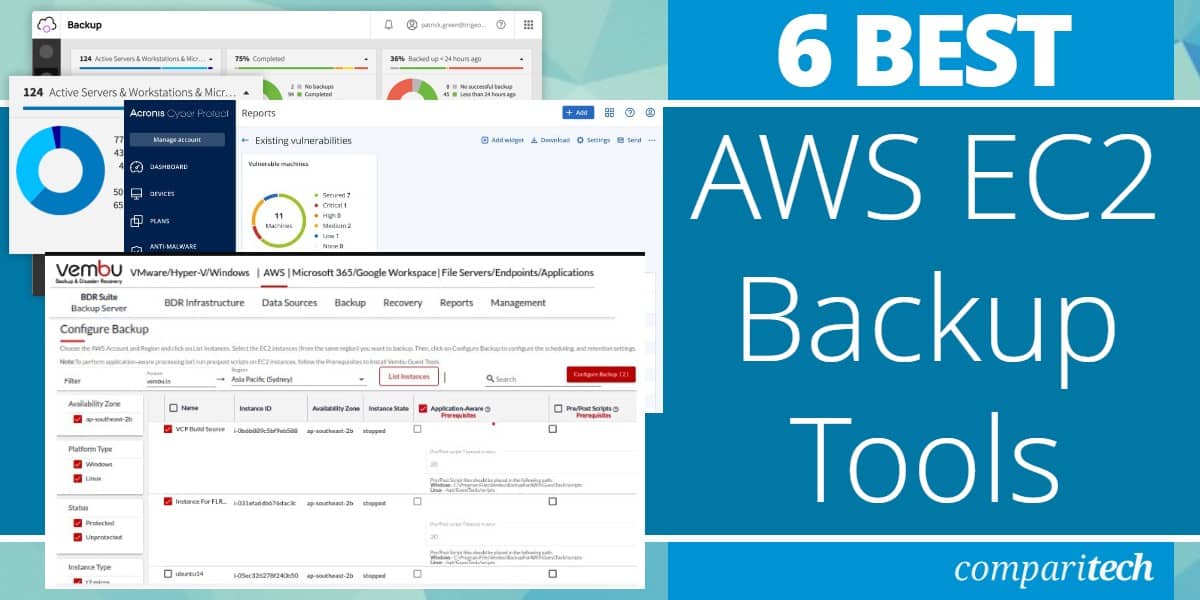
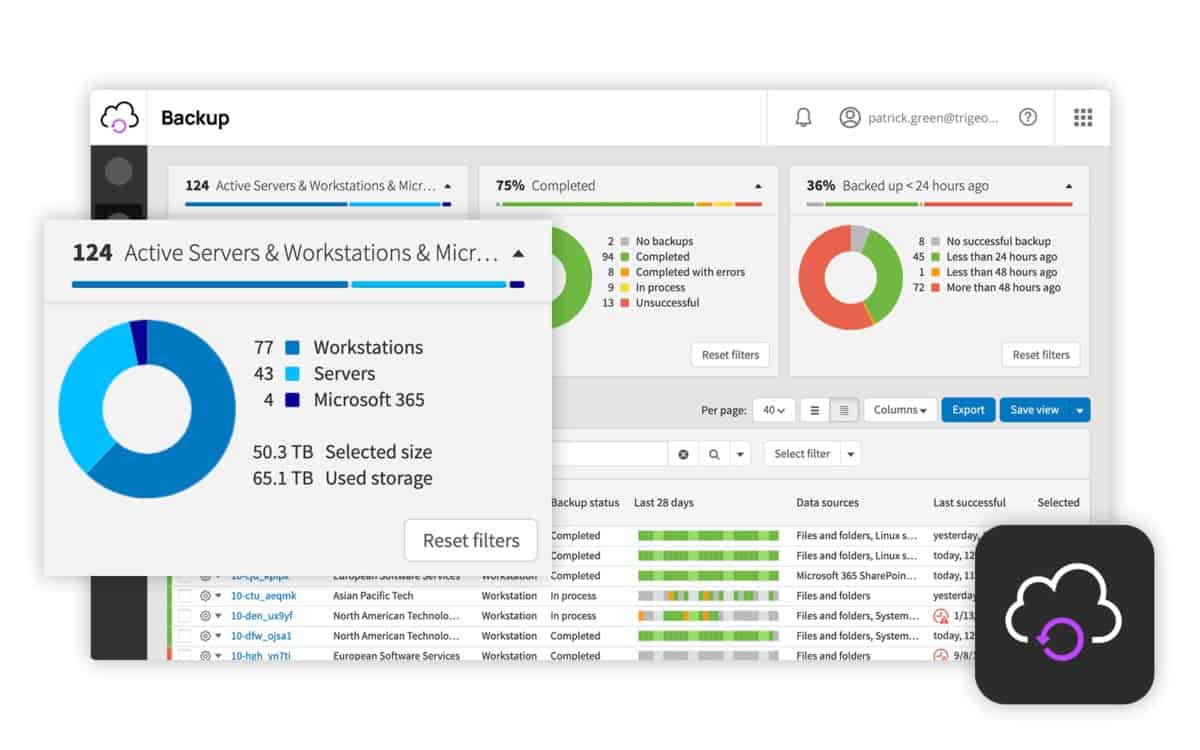

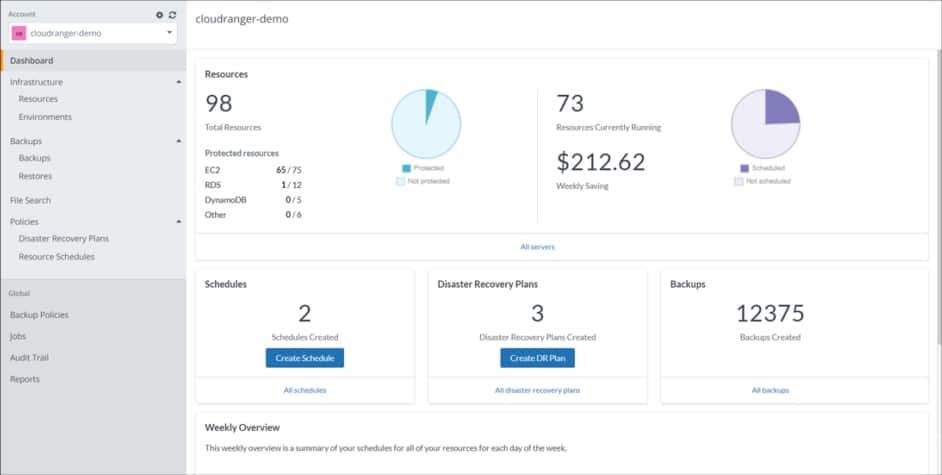
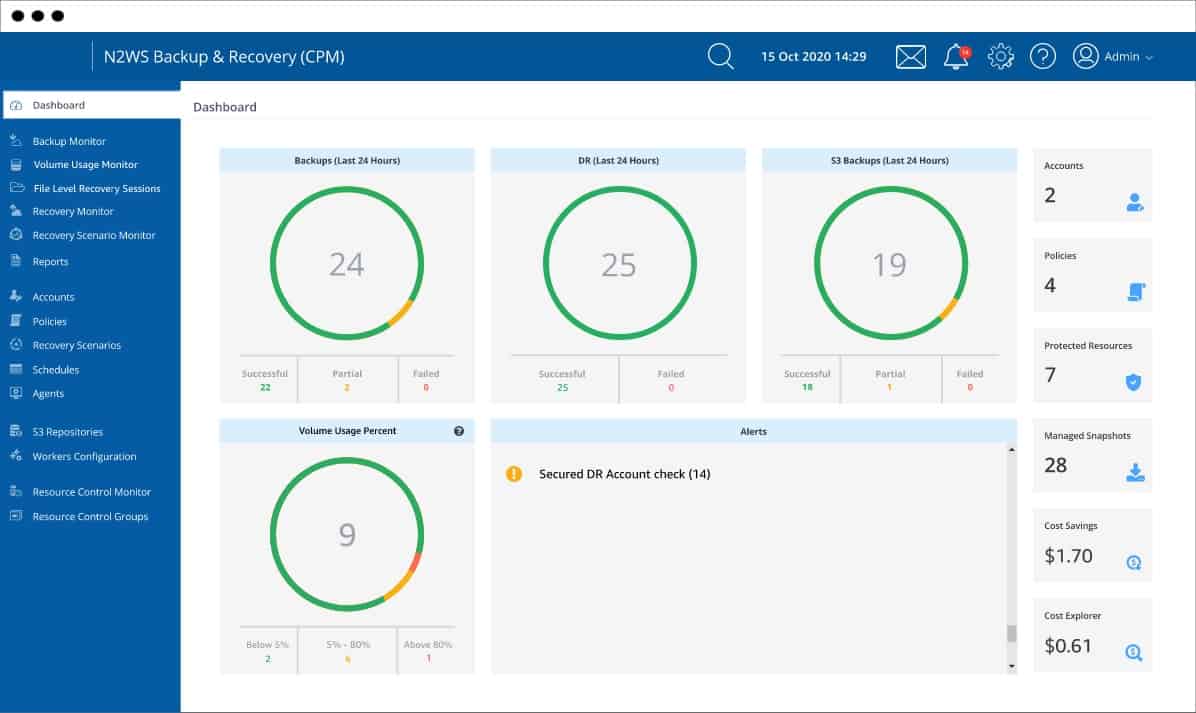
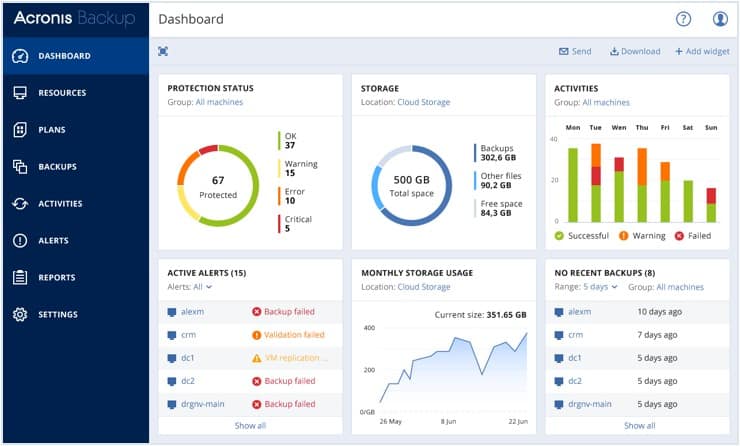
0 Commentaires